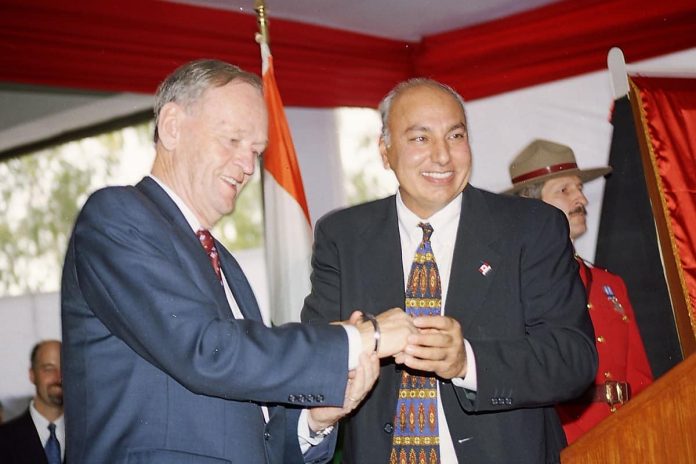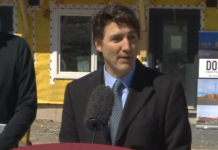… but Chretien always backed him up
BY RATTAN MALL

File photo
HERB Dhaliwal, the first South Asian federal minister who served under then prime minister Jean Chretien, told The VOICE this week that he was at times pressured by fellow ministers and the Prime Minister’s Office (PMO), but stood his ground.
Fortunately for him, his boss always supported him.
Dhaliwal was Minister of National Revenue (1997-1999), Minister of Fisheries and Oceans (1999-2002), and Minister of Natural Resources (2002-2003).
I spoke to Dhaliwal, whom I have known since the 1990s, on Wednesday about his experiences in the wake of the controversy surrounding the resignation of Jody Wilson-Raybould on February 12 as Veteran Affairs Minister and a story some weeks ago in The Globe and Mail that alleged she was pressured by the PMO when she was Justice Minister to intervene in the case of the Quebec engineering company SNC-Lavalin which is facing allegations of fraud and corruption in Libya.
It is being alleged that Wilson-Raybould was demoted because she refused to be pressured.
Prime Minister Justin Trudeau denies all allegations.
Gerald Butts, Trudeau’s principal secretary, resigned on Monday, and both the Conservatives and the NDP are demanding that Trudeau waive solicitor-client privilege so Wilson-Raybould can tell her side of the story to Canadians.
Dhaliwal told me: “There is no doubt that this is probably one of the difficult issues they [Trudeau government] have dealt with.”
He added: “I can only talk about my own experience as a minister. I remember I was confronted with a similar situation where I was asked to do something that I didn’t think was appropriate … by a number of other ministers from Quebec and I went to the Prime Minister [Jean Chretien] and I said ‘You know I can’t do this, Prime Minister, because I don’t think it’s proper. I don’t think it’s transparent. I don’t think it’s ethical.’ And the Prime Minister agreed with me … He told me ‘You’re right and those other people are wrong and I support you.’”
Dhaliwal said: “I did not always agree with the people in the Prime Minister’s Office, too, and I told them ‘No.’ So I think as a minister when you are asked to do something that you don’t think is appropriate, then your first choice is to go to the Prime Minister and say I can’t. And if the Prime Minister still asks you – or your Cabinet colleagues pass something and you don`t agree with the Cabinet [and] you don`t agree with the Prime Minister, you have to resign. I am just telling you what the normal process is. So I think that’s the natural process.”
He pointed out: “One thing you learn is you are the minister who has to wear it if you make the decision because if (someone) advises you or told you do it, you are the minister that at the end of the day has to deal with the issue and you have to wear it if things go wrong.”
REFERRING to the present controversy, Dhaliwal said he didn’t know all the facts about what has transpired. But he noted: “First of all, if Jody Wilson-Raybould was asked by PMO to do something, [and] she didn’t agree with it, her first role would be to go to the Prime Minister and say ‘Look, I can’t do this and I don’t think it’s proper. I don’t think it’s the right way to go and I can’t do it.’ And if the Prime Minister says ‘No, I want you to do it,’ then her other option is to resign. That’s the process.”
Dhaliwal said that he didn’t know what discussion Wilson-Raybould might have had with the Prime Minister. He added: “The question is ‘Why was she demoted then to Veteran Affairs?’ What was the reason for it? I don’t know. … Everybody’s speculating.”
He noted: “I think it’s unfortunate for BC because I think we had a strong minister in the Cabinet and now we don’t; so I think that hurts us. I think the other thing is obviously that she was a woman, she was from an Indigenous community and so it hurts us that she’s not there, which is unfortunate.”
But Dhaliwal pointed out: “At the end of the day, the Prime Minister makes the decision who’s in his Cabinet and who’s not. And everybody accepts that. That’s his decision. Hopefully, the facts will come out.”
He also noted that ministers sometimes resign. “We had John Turner resign from Pierre Trudeau’s government because he couldn’t agree with the Prime Minister,” he added.
Dhaliwal said: “So in the past we’ve had ministers who have resigned and it hits the government, but then the government keeps going. It’s one person. The government is a lot bigger than one minister or one person.”
DHALIWAL said that Chretien believed that the ministers had a job to do and he said: “Do your job. If you have a problem come and see me, otherwise, I expect you to do your job.”
Dhaliwal recalled the time when US President George Bush went to war in Iraq and he said ‘the President of the United States is not a statesman.’
He added: “And the guys in the PMO wanted me to apologize and I said ‘No, I am not going to apologize.” And the Prime Minister never called me to ask me to apologize. But the PMO guys were upset ‘oh, you are hurting our Canada-US relations and you should apologize.’ There was a lot of pressure on me to apologize. “
Dhaliwal said: “I went to the Prime Minister and said ‘look, I am sorry. I didn’t want to cause you problems. I am supposed to help you solve problems. I am sorry if I caused a problem for you.’ He said ‘You didn’t get a call from me, did you?’ I said ‘Yeah, but your guys in PMO were you know…’ He said ‘Don’t worry, don’t worry, you didn’t get a call from me.’”
Dhaliwal added: “He always supported me. He always supported my position. … He told me ‘Go do your job. If you have a problem, come see me.’ That’s it. He was a good boss.”












